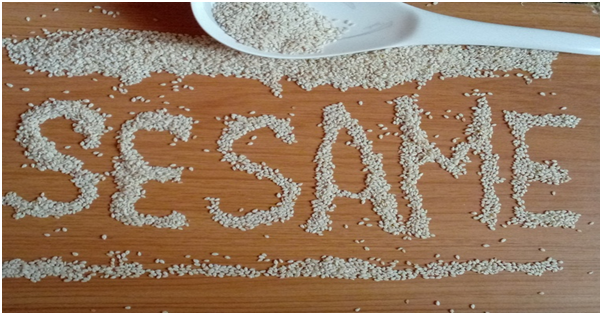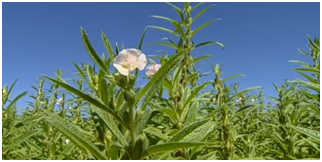While enjoying a yummy hamburger in a Fast-food restaurant, you may have noticed tiny sprinkled off-white or light brown seeds on the top of the buns, giving a marvelous look to it. These might be sesame seeds, which give a nice look to your hamburger and a good nutty taste as well. Sesame is used in different food cuisines and bakery products like bread, burger buns, crackers, and many other sweets. In this article, we’ll explain the facts about sesame and some of sesame’s health benefits.


HISTORY
The plant’s name is Sesamum indicium. The word sesame is derived from the Latin word “sesamum” and the Greek word “sesamon”.
CULTIVATION



Sesame is a tropical flowering plant that is found all over the tropical regions of the world, but mainly in the African and Indian subcontinent. It contains many small edible seeds rich in oil and contains many nutrients. It is also cultivated for the production of oil in many parts of the world.
One very important feature of sesame is that it can grow in unfavorable environmental conditions where other crops are difficult to grow and hence called survivor crops. It is said that this is the oldest oilseed crop.
The height of sesame is 1.5 to 3.5 with white tubular flowers but in some sesame purple, pink or blue flowers are also seen. The color of the seeds is mostly off-white, but other colors like brown, gold, gray, and black are also present depending on the types of the plants.
Nutritional value
Source =United States Department of Agriculture, Agricultural Research Service
100 grams of whole dried sesame seed contains the following important nutritional ingredients;
Total energy
Energy = 573 kcal
Protein and Amino Acids
Protein = 17.73 g
Glutamic acid = 3.995 g
Leucine = 1.358 g
Isoleucine = 0.763 g
Lysine = 0.569 g
Threonine = 0.736 g
Tryptophan = 0.388 g
Aspartic acid = 1.646 g
Glycine = 1.215 g
Alanine = 0.927 g
Valine = 0.99 g
Tyrosine = 0.743 g
Pheyl alanine = 0.94 g
Cystein = 0.358 g
Methionine = 0.586 g
Histadine = 0.522 g
Arginine = 2.63 g
Serine = 0.967 g
Proline = 0.81 g
Fats and fatty acids
Total fat = 49.65 g
Polyunsaturated fatty acids = 21.773 g
Monounsaturated fatty acid = 18.759 g
Saturated fatty acid = 6,957
Cholesterol = 0 mg
Minerals
Calcium, Ca= 975 mg
Iron, Fe= 14.55 mg
Magnesium = 351 m g
Phosphorus, P = 629 mg
Potassium K = 468 mg
Sodium = 11 mg
Zinc, Zn = 7.75 mg
Copper, cu = 4.082 mg
Selenium, Se = 34.4 μg
Vitamins
Thiamin,B1 = 0.791 mg
Riboflavin,B2 = 0.247 mg
Niacin,B3 = 4.515 mg
Pyridoxine ,B-6 =0.79 mg
Folate = 97 μg
β-Carotene = 5 μg
Vitamin A = 9 IU
Vitamin E = 0.25 mg
Others
Choline = 25.6 mg
Total dietary Fiber = 11.18 g
Total sugar = 0.3 g
Phenolics = 129.7 to 355.3 mg .
Lignans = 224-1148 mg
HEALTH BENEFITS
Sesame contains many vitamins and minerals which play a vital role to maintain our health.
Sesame rich in nutrients
• Sesame seeds are an excellent source of protein, healthy fats, and dietary fiber.
• They also contain several essential minerals, including calcium, iron, magnesium, phosphorus, potassium, and zinc.
• Sesame seeds are also high in vitamin E, an antioxidant that helps protect against oxidative damage.
Sesame may improve heart health
They can reduce LDL or bad cholesterol. Sesame seeds also contain lignans and phytosterols, which may have additional cardiovascular benefits
Bone health and arthritis
Sesame is a good source of calcium from a plant source. 100 grams of sesame-dried seed contain about 970 mg of calcium. As we know that calcium is important for bone health, so these tiny unhulled seeds are good for your bones.
They also contain other bone-building nutrients, including magnesium, phosphorus, and zinc.
Consuming sesame seeds regularly may help improve bone density and reduce the risk of osteoporosis.
Osteoarthritis is a common disease in the older age group that can damage joints of the body due to the inflammatory process. As seeds have anti-inflammatory properties, they may help in joint pain.1
The Good source of fibers
100 grams of sesame contain 16.9 gms of fiber.2
Dietary fibers may help to protect you from various like hypertension, obesity, diabetes, coronary heart disease, stroke, and certain gastrointestinal diseases.3
Sesame may support healthy digestion
Sesame seeds are a good source of dietary fiber, which is essential for healthy digestion.
Fiber helps keep the digestive system running smoothly by promoting regular bowel movements and preventing constipation.
Sesame seeds may also have prebiotic properties, which means they can promote the growth of beneficial gut bacteria.
Help to control blood pressure
Sesame contains many nutrients which may have beneficial effects on your blood pressure. For instant poly-unsaturated fat, phytosterol, lignans, magnesium, and vitamin E are such contents which are helpful in regulating your blood pressure.4
Anti-aging and Anti-oxidant properties
Free radicals are produced in the body which can destroy your body cells and are linked to the aging process. Beta-carotene phenolic and lignan of sesame may reduce free radical production and thus have anti-oxidant properties.5
Sesame may have anti-cancer properties
Sesame seeds contain lignans, which have been shown to have anti-cancer properties.
Lower cholesterol level
As sesame has monosaturated fatty acid, fibers, and Liganan which have lipid-lowering properties.6, 7
So by lowering lipids, sesame protects you from bad lipids, which in turn may protect you from other diseases like coronary heart disease.
Good source of protein
Sesame contains some essential amino acids like cysteine, tryptophan, and methionine.8
Amino acids are the building blocks of protein synthesis. In this way sesame can provide some amino acid but for other amino acids, you must take an animal source of protein.
Boost immunity
Sesame is a rich source of vitamin A, vitamin B6, vitamin E, Cooper, iron, zinc, and selenium. These all help to build immunity. In this way, sesame boosts your immunity and helps to fight against various diseases.9
Good for skin and hair
Zinc, Selenium, Iron ad vitamins A, B, and E are helpful in the healthy growth of the hair.10
Improve vision
Beta-carotene and vitamin A are essential for vision.11
Good for post-menopausal women
The Lignan present in sesame is converted into Enterolactone by a gut microorganism, which has estrogenic activity. Thus, sesame help to reduce various symptoms in women after menopause.12, 13
Sesame may reduce inflammation
Sesame seeds contain compounds called lignans, which have anti-inflammatory properties.
References
1-Effects of sesame seed supplementation on inflammatory factors and oxidative stress biomarkers in patients with knee osteoarthritis.
Khadem Haghighian M1, Alipoor B2, Malek Mahdavi A3, Eftekhar Sadat B4, Asghari Jafarabadi M5, Moghaddam A6.
2- U.S. DEPARTMENT OF AGRICULTURE Agricultural Research ServiceNutr Rev. 2009 Apr;67(4):188-205. doi: 10.1111/j.1753-4887.2009.00189.x.
3-Health benefits of dietary fiber.
Anderson JW1, Baird P, Davis RH Jr, Ferreri S, Knudtson M, Koraym A, Waters V, Williams CL.
4-. “Can sesame consumption improve blood pressure? A systematic review and meta-analysis of controlled trials”. Journal of the Science of Food and Agriculture. 97 (10): 3087–3094
. Khosravi-Boroujeni H, Nikbakht E, Natanelov E, Khalesi S
5-” Effects of the Intake of Sesame Seeds (Sesamum indicum L.) and Derivatives on Oxidative Stress: A Systematic Review”. Journal of Medicinal Food. 19 (4): 337–345. Gouveia Lde A, Cardoso CA, de Oliveira GM, Rosa G, Moreira AS (2016).
6- Br J Nutr. 2016 Mar 14;115(5):764-73. doi: 10.1017/S0007114515005012. Epub 2016 Jan 13.
Sesame fractions and lipid profiles: a systematic review and meta-analysis of controlled trials.
Khalesi S1, Paukste E1, Nikbakht E2, Khosravi-Boroujeni H1.
7- The effect of dietary intake of sesame (Sesamumindicum L.) derivatives related to the lipid profile and blood pressure: A systematic review.
Cardoso CA1, Oliveira GMM1, Gouveia LAV2, Moreira ASB3, Rosa G4.
Crit Rev Food Sci Nutr. 2018 Jan 2;58(1):116-125. doi: 10.1080/10408398.2015.1137858. Epub 2017 Jun 28.
8- Effect of processing on some minerals, anti-nutrients and nutritional composition of sesame (Sesamum indicum) seed meals Electronic Journal of Environmental, Agricultural and Food Chemistry 10(1):1858-1864
9-Sesame seeds essential oil and Sesamol modulate the pro-inflammatory function of macrophages and dendritic cells and promote Th2 response.
Medical journal of the Islamic Republic of Iran 32:98-98DOI: 10.14196/mjiri.32.98
10- The Role of Vitamins and Minerals in Hair Loss: A Review
Hind M. Almohanna, 1 Azhar A. Ahmed,2 John P. Tsatalis,3 and Antonella Tosti3Dermatol Ther (Heidelb). 2019 Mar; 9(1): 51–70. 2018 Dec13. doi: 10.1007/s13555-018-0278-6.
11-β-Carotene Is an Important Vitamin A Source for Humans1,2,3
Tilman Grune,4 Georg Lietz,6 Andreu Palou,7 A. Catharine Ross,8 Wilhelm Stahl,9 Guangweng Tang,10 David Thurnham,11 Shi-an Yin,5 and Hans K. Biesalski4,*
12- Sesame Ingestion Affects Sex Hormones, Antioxidant Status, and Blood Lipids in Postmenopausal Women
Wen-Huey Wu, Yu-Ping Kang, Nai-Hung Wang, Hei-Jen Jou, Tzong-An Wang
The Journal of Nutrition, Volume 136, Issue 5, May 2006, Pages 1270–1275, https://doi.org/10.1093/jn/136.5.1270
13- The pros and cons of plant estrogens for menopause.
Bedell S1, Nachtigall M, Naftolin F.
J Steroid Biochem Mol Biol. 2014 Jan;139:225-36. doi: 10.1016/j.jsbmb.2012.12.004. Epub 2012 Dec 25.
14-Bioorg Med Chem Lett. 2012 Aug 15;22(16):5215-7. doi: 10.1016/j.bmcl.2012.06.068. Epub 2012 Jul 3.Pinoresinol is a putative hypoglycemic agent in defatted sesame (Sesamum indicum) seeds through inhibiting α-glucosidase.
Nice work by author particularly about nutrition value of sesame. More articles about Sesame sould be published.
Excellent